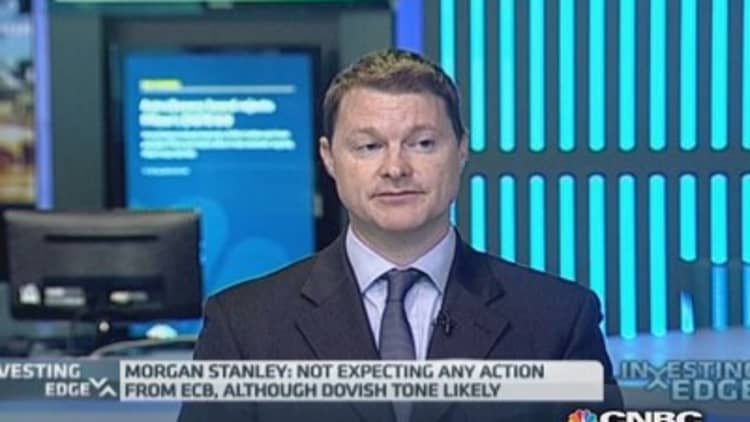After euro zone inflation disappointed once again in April, the focus is back on European Central Bank (ECB) as yet another rate decision looms. However, for the sixth month in a row, analysts expect little or no action from bank President Mario Draghi – instead he'll be resorting to talking the talk.
Analysts have been waiting for action from the ECB ever since it last cut interest rates in November in response to fears that the region could be heading for a period of growth-sapping deflation.
But euro zone inflation picked up slightly in April, according to data released last week, coming in at 0.7 percent – not as much as hoped for and still a way off the ECB's 2 percent target. Nonetheless, economists think it could be strong enough for the central bank to resist a material change in policy stance.
Read MoreWhy the ECB has to act… versus why it shouldn't
April's uptick in inflation comes alongside a string of other data releases which continue to indicate a slow but steady strengthening of the 18-country currency bloc's economy.
Markit's purchasing managers' index showed Tuesday that business activity in the euro zone hit a three-year high in April. While the Organisation for Economic Co-operation and Development (OECD) said it expects the euro zone to notch up growth of 1.2 percent this year, and 1.7 percent in 2015.
"(Recent) economic data was rather more of the same, than providing new guidance," said Carsten Brzeski, senior economist at ING, in a note. "We think that the ECB will once again try to buy some time with words, not with deeds."
But Draghi will have to watch his words in case they add strength to the euro – a factor that is already plaguing the euro zone's nascent recovery.
Read MoreECB to get drastic? QE could be on the table
A stronger euro makes euro zone exports more expensive in the global market, thereby hindering the euro zone's efforts to grow and regain its competitiveness. But the euro has risen over 6.5 percent against the dollar over the past 12 months – and shows no sign of slowing.
As such, Howard Archer, chief European economist at Global Insight, said he expects a dovish tone from Draghi on Thursday.
"If euro zone consumer price inflation does not dip anew from 0.7 percent in April, the euro does not move above $1.40 on a sustained basis and the euro zone manages to keep on recovering gradually, the ECB may well get away without having to take any further action," he said in a note.
End 'sterilization'?
Not all economists are convinced that there will be no action from the ECB, with some arguing that something needs to be done about the lack of money flowing around the euro zone.

Poor liquidity has hindered the region's recovery. Lending is a sign of a buoyant economy, as consumers and businesses feel confident enough to borrow – and spend.
Read MoreIMF calls for ECB action: What are Draghi's options?
But lending to both businesses and households continued to fall in March, according to the most recent ECB data, and overnight bank-to-bank borrowing costs have also risen – a sign of tight liquidity.
One option open to the ECB is the ending of its efforts to offset its government bond purchases. Currently, the ECB "sterilizes" the money it spent buying sovereign bonds during the euro zone's debt crisis under the Securities Markets Program (SMP) - a move designed to avoid inflation or currency appreciation.
"Unless the ECB acts quickly, the risk is that the pick-up in market rates will accelerate, further impairing the balance sheets of euro area banks," Fathom Consulting economists said in a note, adding that the central bank could announce the end of sterilization this Thursday.
"Not in order to contain disinflation, but in order to restore liquidity to the market (a shorter term, tactical goal)," they said. "The primary aim of the sterilisation was to prevent unwanted inflation, but now that is the last of the ECB's concerns."
Anatoli Annenkov, euro area economist at Societe Generale, agreed that the ECB was set to end sterilization.
He said this would not only "send a reassuring message" that it stands ready to boost liquidity – but also add a much-needed 172 billion euros to the euro zone's economy.


